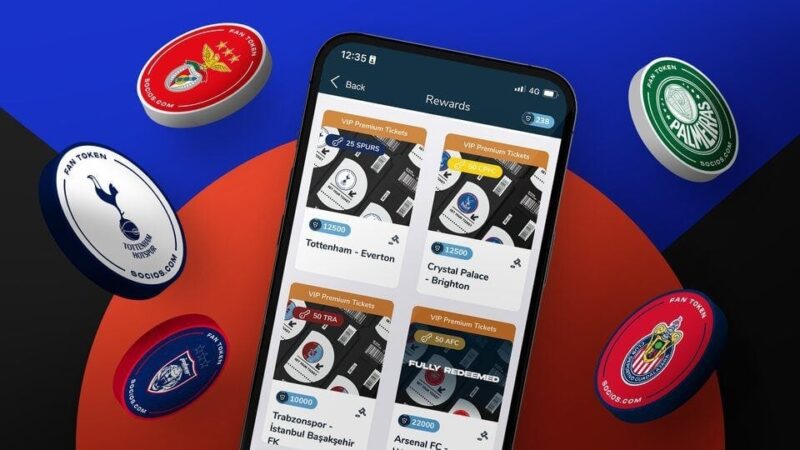Sports
Premier League Expands Blockchain Ticketing and Fan Token Projects

The Premier League is accelerating its digital transformation with an expanded rollout of blockchain-based ticketing and fan token initiatives across multiple clubs. As one of the most influential sporting leagues in the world, the Premier League’s move signals a growing commitment to innovation, transparency, and fan engagement in the digital age. The technology, once viewed as experimental, is now being embraced as a practical solution for secure ticketing and new fan experiences.
Blockchain ticketing systems are helping clubs combat fraud, streamline access control, and provide traceable ownership for event passes. At the same time, fan tokens are creating fresh opportunities for supporters to participate in club-related decisions and gain exclusive benefits. With clubs like Manchester City, Arsenal, and Tottenham Hotspur already exploring blockchain partnerships, the league’s wider adoption is expected to redefine how fans connect with the game both inside and outside stadiums.
Blockchain Technology Enhances Security and Transparency
One of the most significant benefits of blockchain ticketing is its ability to eliminate fake tickets and scalping. Traditional ticket resale markets have long been plagued by fraud and inflated prices, which undermine fans’ trust and accessibility. By storing ticket data on blockchain networks, each ticket becomes a verified digital asset tied to a unique identity. This prevents duplication and ensures that every transaction can be traced securely from issuer to attendee.
In addition to security, blockchain technology improves operational efficiency. Clubs can track attendance in real time, manage transfers between fans, and issue digital tickets directly to mobile wallets. The system also allows teams to implement dynamic pricing strategies that reflect real demand while maintaining fairness for genuine supporters. The Premier League’s adoption of this model aligns with global trends in event management and positions the UK as a leader in digital sports innovation.
Fan tokens are also gaining popularity across major clubs. These digital assets allow supporters to access exclusive rewards, vote in polls, and participate in community events. For instance, fans may use tokens to vote on a pre-match anthem, choose design elements for training gear, or receive priority access to limited-edition merchandise. Such initiatives are not just about novelty but about deepening emotional engagement and loyalty in an increasingly digital fan culture.
Clubs, Partnerships, and Market Expansion
A growing number of Premier League clubs are forming partnerships with blockchain and fintech companies to develop customised fan engagement platforms. These collaborations allow teams to integrate blockchain ticketing, collectibles, and community features into a single digital ecosystem. Blockchain-based fan engagement firms have reported significant user growth as fans explore the benefits of token-based memberships and virtual club experiences.
The expansion of these programs is also drawing attention from sponsors and investors. As blockchain infrastructure becomes more reliable, brands see opportunities to align with cutting-edge technology while reaching global audiences. Clubs are leveraging these innovations not only for revenue diversification but also for brand differentiation in a highly competitive sports market.
Industry analysts note that blockchain ticketing and fan tokens may soon extend beyond football. Other sports leagues, including rugby and cricket, are observing the Premier League’s approach as a potential model for fan engagement. The technology could eventually integrate with virtual reality and augmented reality platforms, allowing supporters to experience matches in immersive digital environments while maintaining verifiable ownership of digital assets.
Fan Experience, Regulation, and Future Challenges
Despite strong momentum, blockchain adoption in sports comes with challenges. Regulators and consumer groups have expressed concerns about volatility and the speculative nature of fan tokens. Some fans worry that token ownership may create a financial divide, rewarding only those who can afford to participate. To address this, Premier League clubs are focusing on creating accessible, low-cost participation models that prioritise inclusivity and transparency.
Clubs are also working closely with financial regulators to ensure compliance with UK laws governing digital assets and consumer protection. Education initiatives are being introduced to help fans understand how blockchain ticketing and fan tokens work, what their limitations are, and how to engage safely. These steps are intended to build long-term trust between clubs and supporters as the digital transformation accelerates.
Environmental impact is another area of consideration. As the technology matures, clubs are choosing blockchain networks that prioritise energy efficiency and sustainability. The focus is on developing systems that align with the Premier League’s broader commitments to environmental responsibility and ethical innovation.
Conclusion
The Premier League’s embrace of blockchain ticketing and fan token projects represents a pivotal step in the evolution of sports engagement. By combining security, transparency, and interactivity, the league is setting a new global standard for how fans connect with their favourite teams. As more clubs join the initiative, blockchain technology is likely to become an integral part of the modern football experience, blending passion, technology, and community in ways that redefine what it means to be a supporter.










